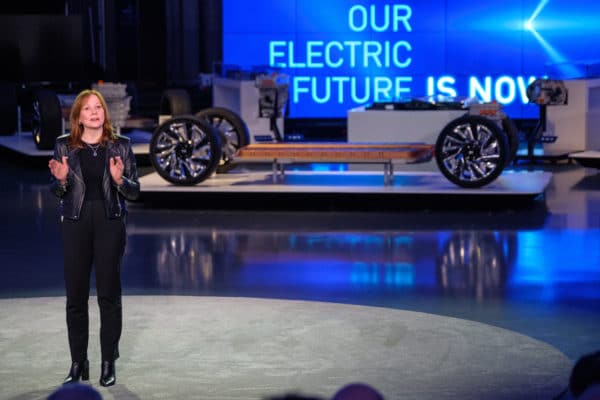Less than a year after pulling out of Australia and killing off the Holden brand, and several years after shutting down its Australian manufacturing operations, GM on Friday shared its vision for an all-electric future and the EVC said the timing is no coincidence.
EVC chief executive Behyad Jafari said GM’s announcement underscored just how out of step Australia currently is with the rest of the world on electric vehicles (EVs).
“It’s no coincidence that GM decided to pull out of Australia shortly before making this announcement,” he said.
“The rational view for GM to form is that Australia is a low-priority nation for its all-electric future.
“Not only are we one of the only countries not to enforce fuel efficiency standards, we are the only nation proposing brand new punitive taxes on electric vehicles instead of incentives.
“The unimaginative and cynical approach our politicians have taken to electric vehicles in recent years means Australia is being left behind as the rest of the auto industry zooms ahead.”
Figures provided by the International Energy Agency show that EV sales have soared since they first entered commercial markets in the first half of the last decade. Only about 17,000 electric cars were on the world’s roads in 2010. By 2019, that number had swelled to 7.2 million.
Globally electric cars accounted for 2.6% of all new car sales in 2019 or about 2.1 million cars. That was much higher in places like China where EVs comprised around 5% of the market, the EU around 3.5%, and Norway, where more than half of all new cars sold were electric.
But Australia is however lagging behind with the lowest uptake of any comparable country. In 2019 electric cars made up just 0.6% of new car sales for a total of just over 6,700 new EVs.
While cost and lack of supporting infrastructure are certainly contributing factors, the EVC has warned plans by some state governments to introduce distance-based EV taxes is threatening the sector.
South Australia and Victoria have outlined plans to introduce a distance-based EV tax from July 2021 while the New South Wales government is also considering the introduction of road-user charges for EVs.
“On current policy settings we are being left behind as the world accelerates toward electric vehicles,” Jafari said.
“GM’s announcement underscores how fallacious the argument is that we can sit on our hands and just let the electric vehicle revolution happen to us. Other nations will jump ahead and capture all the benefits of the electric vehicle revolution and Australia will be left languishing decades behind.
“We need our politicians to wake up now and start investing in stimulating and encouraging the transition to electric vehicles before it’s too late.”

Image: GM
GM is the latest in a long line of manufacturers to enter the EV market. While Tesla has been a fixture in Australia for years now, MG recently launched its first offering here while Toyota, BMW, Nissan, Audi, Mercedes-Benz, Jaguar, Hyundai and Mini are among others to have joined the race.
GM chair and CEO Mary Barra said the United States-based automaker has set a goal of making the vast majority of the vehicles it produces electric by 2035, and the entire company carbon neutral, including operations, five years after that.
GM had already announced it will invest $27 billion in electric and autonomous vehicles in the next five years and will offer 30 all-electric models worldwide by the middle of the decade. The company plans to include crossovers, SUVs, sedans and trucks in its EV line-up.
GM said it will source 100% renewable energy to power its United States sites by 2030 and global sites by 2035.
This content is protected by copyright and may not be reused. If you want to cooperate with us and would like to reuse some of our content, please contact: editors@pv-magazine.com.









Another “head in the sand” solution for Australia…. if EV’s use Electric (Lithium-Ion Batteries) each Battery will leave behind toxic waste when they “die” in a few years. Just like Nuclear Waste the Govt (aka The People) will be left to “manage and take over” these Wastes….
Each vehicle has about 300-500kg Battery containing Toxic Cobalt and Lithium and who knows what else too….
Only CAV’s (Compressed Air Vehicles) can solve the Pollution problem….
Perhaps Australia can commit a few Million Dollars for converting existing ICE (Internal Combustion Engines) Vehicles to CAV’s to prove feasability…. and permit early “take-off” using existing Vehicle Manufacturing Infrastructure … or other Options that developed CAV’s from… scratch…
[ Please note if the Thermal Energy produced during Air Compression is recovered…quite readily…… the Efficiency of this Option will rise dramatically and offset any “technical penalty” of lower Efficiency too].